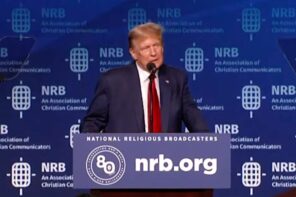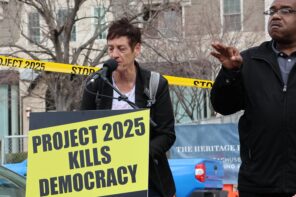LOS ANGELES, CA—To the average passerby, Azusa Street is little more than a brick-lined pedestrian alley in downtown Los Angeles, across the street from a bank and a cell phone store and a block away from a Little Tokyo walking mall. But up on a streetlight at the alley’s entrance, a city historical marker is tacked: Azusa St. Mission… Cradle of the Worldwide Pentecostal Movement.
For some, this is sacred ground: the place where the Azusa Street Revival, the founding moment of the modern Pentecostal christian church, made its home in 1906, after a small home prayer gathering in nearby Echo Park led by Pastor William J. Seymour was suddenly flooded in what they believed to be the Holy Spirit.
On New Year’s Eve, worshippers will gather here again, in the courtyard of the next-door Japanese American Cultural & Community Center, to pray for another revival. It’s the latest stop on a nationwide “worship protest” campaign, led by Sean Feucht, a worship leader, failed congressional candidate, and would-be revivalist.
Feucht’s Let Us Worship events have become regular news cycle fodder, with largely maskless crowds flouting local rules on social distancing and worship gatherings. Feucht has styled the events as protests of Covid-induced restrictions on worship, a move critics say is to excuse blatant rule-breaking and obscure the real purpose of the events.
And while courts have given credibility to aspects of Feucht’s argument—most notably in a series of recent Supreme Court decisions in favor of houses of worship opposed to local restrictions—Feucht himself seems to have a higher calling in mind: religious revival.
His personal website sells “Revival or Bust” T-shirts, and his social media is chock full of references to the late 1960s “Jesus People” movement that reset the cultural direction of the evangelical church.
Lately, his attention has turned to Azusa Street. The New Year’s Eve Let Us Worship schedule includes the normal worship service—this one in a Valencia, California parking lot—but it also features an evening Skid Row outreach on Dec. 30, and an Echo Park outreach and “redigging the well” stops at the Azusa Street site and at the former home of Aimee Semple McPherson, a mid-century evangelist who founded the Foursquare church.
Feucht—who has not responded to multiple requests for comment—said in an Instagram Live video last week that he’s taking inspiration from the public-crisis-driven early days of both movements. Azusa Street came on the heels of the 1906 San Francisco earthquake, and McPherson’s early ministry included barnstorming public healings during the 1918 Spanish Flu pandemic.
Some experts, though, aren’t convinced by the comparison.
“He seems like an opportunist,” said Diane Winston, a religion and media professor at the University of Southern California, noting that while McPherson and Seymour were unknown preachers who ground their way to outsized cultural influence, “[Feucht] rode [here] on the coattails of the church closing because of the pandemic.”
And though Feucht has said that black lives matter, he has also expressed distaste for Critical Race Theory and the Black Lives Matter organization and drawn criticism for his quick-strike “Riots to Revival” worship events at this summer’s racial justice protests. Erica Ramirez, a sociologist at Auburn Seminary who studies Latinx religion and Pentecostalism, said the Azusa Street revival was revolutionary precisely because it exploded traditional racial hierarchies.
“[Azusa Street came at] a time where Jim Crow laws were still in place, where lynchings were still happening. William Seymour was the son of former slaves. It was radical for white people to be going to a church where a Black leader is in charge,” said Ramirez.
For his Azusa Street stop, Feucht is partnering with the Azusa Street Mission and Historical Society, a ministry founded in 2006 by Fred and Wilma Berry, a pair of Black pastors. His stop will run concurrently to the mission’s own New Year’s Eve worship event, during which they’ll be planting a “unity tree” in the courtyard of the JACCC.
Ramirez said the brief stop is not enough to lend Azusa-esque credibility to Feucht’s racial reconciliation efforts: “By comparison, this is tepid and meager and totally behind the ball.”
Fred Berry, who couldn’t be reached for an interview, declared in a press release that “The color line is washed away in the blood of Jesus!” and announced plans for a mural to honor Seymour and the “movement which stood on holy ground and declared racial reconciliation in a time of great racial division in America.”
Like Feucht, Berry is hoping for revival, and told Charisma News, “We’re looking for something we’ve never seen. We know what it looks like in the days of Billy Graham, and we know what we’re expecting. It’s got to be something bigger than we’ve seen, and it’s got to be unified.”
Ramirez says these sorts of calls for revival are a normal part of American history:
“Since the Revolution, American Christians have believed that this is a special Christian nation. Revival happened if the population was getting too irreligious. Symbolically, today, Christianity has lost its hegemony [in America]. It’s classic for American Christians to say ‘Now we need a revival,’ in an effort to purify the nation so it can have that special covenantal relationship with God.”
This sort of Christian Nationalism also seems to be a driving force for Feucht and his “Revival or bust” attitude, one that could carry his movement past the end of the pandemic and into a post-Trump world.
That attitude bothers some of the local organizers who are protesting the coronavirus risks of Feucht’s LA event—in particular a pair of “outreaches” in Skid Row and Echo Park (outdoor masked, distanced worship services are now legal in California, but, as noted earlier, Feucht’s events have tended to be maskless and crowded).
The California Poor People’s Campaign sent a legal letter to local officials asking them to halt the event, and a coalition of Skid Row advocates, dubbed the Resistance against Biological Warfare, is planning a protest of tonight’s outreach in Skid Row.
“If you’re not gonna wear something as simple as a mask, if you don’t care about their life, you don’t care about their soul. You care [only] about religion,” said Pastor Cue Jn Marie, the pastor of Skid Row’s Church Without Walls and one of the lead organizers of the Resistance Against Biological Warfare. Jn Marie worries the event could spread coronavirus into Skid Row, and said he reached out to Feucht via Facebook last week with no response.
It’s those risks Feucht is taking—the ones that earned him the “Jesus Christ Superspreader” moniker from Rolling Stone magazine—that underscore how serious he is about revival. With the Supreme Court decision allowing worship services, the mission that launched Feucht’s worship protests is moot. His real work might be just beginning. It truly is revival or bust.





